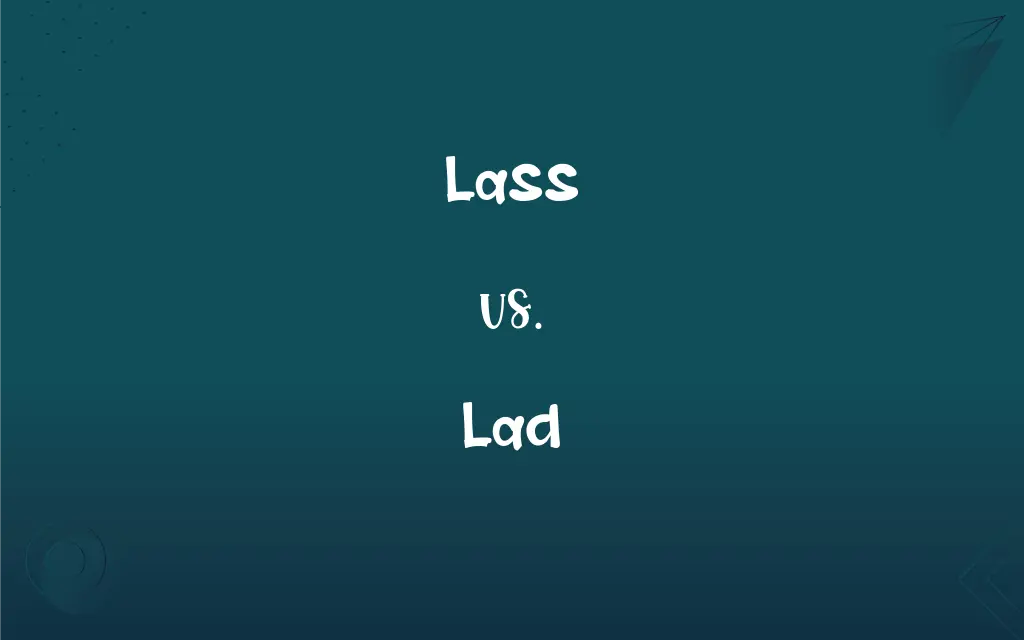Lass vs. Lad: What's the Difference?
By Aimie Carlson & Janet White || Updated on May 22, 2024
"Lass" refers to a young girl or woman, while "lad" refers to a young boy or man. Both terms are often used in informal or dialectal contexts.

Key Differences
Lass" is a term primarily used to refer to a young girl or woman. It's often found in informal or regional dialects, particularly in British English. For example, "The lass was cheerful and full of energy" illustrates its usage. This term conveys a sense of familiarity and affection. On the other hand, "lad" refers to a young boy or man. Similar to "lass," it's frequently used in informal or dialectal speech. For instance, "The lad helped his father in the garden" shows its typical context. "Lad" is commonly used in both British and Irish English.
While "lass" is gender-specific to females, "lad" is exclusively male. This clear gender distinction makes them easy to differentiate. Both terms are also often used endearingly, adding a personal touch to the description of young individuals.
In regional dialects, these terms carry cultural significance. "Lass" is commonly used in Scottish and Northern English dialects, whereas "lad" is widespread across various British dialects. These terms highlight regional linguistic traditions.
Though informal, "lass" and "lad" remain prevalent in certain areas, maintaining their charm and cultural relevance. They evoke a sense of nostalgia and connection to traditional language.
Comparison Chart
Definition
A young girl or woman
A young boy or man
ADVERTISEMENT
Gender
Female
Male
Usage Context
Informal, regional, dialectal
Informal, regional, dialectal
Common Regions
Scotland, Northern England
Widespread in British and Irish English
Cultural Significance
High in certain dialects
High in various British dialects
Lass and Lad Definitions
Lass
A young woman.
She's a fine lass with a bright future.
ADVERTISEMENT
Lad
A young boy.
The lad played football in the park.
Lass
A girl from a specific region.
She's a Scottish lass.
Lad
A boy from a specific region.
He's a Yorkshire lad.
Lass
A young girl.
The lass danced happily in the meadow.
Lad
A young man.
He's a good lad, always helping others.
Lass
An affectionate term for a girl.
Come here, lass, and tell me about your day.
Lad
Informal term for a male.
The lad next door mowed the lawn.
Lass
Informal term for a female.
The lass at the shop was very helpful.
Lad
A boy or young man.
Lass
A girl or young woman.
Lad
(Informal) A man of any age; a fellow.
Lass
A sweetheart.
Lad
A boy or young man.
Lass
A young woman or girl.
Come and dance, ye lads and lasses!
Lad
(British) A Jack the lad; a boyo.
I think he reckons he's a bit of a lad.
Last night I was out drinking with the lads.
Lass
A sweetheart.
Lad
A familiar term of address for a young man.
Come here, lad, and help me shift these boxes.
Lass
A young woman; a girl; a sweetheart.
Lad
A groom who works with horses.
Lass
A girl or young woman who is unmarried
Lad
The penis.
Lad
A boy; a youth; a stripling.
There is a lad here, which hath five barley loaves and two small fishes.
Lad
A companion; a comrade; a mate.
Lad
A boy or man;
That chap is your host
There's a fellow at the door
He's a likable cuss
Lad
A male child (a familiar term of address to a boy)
Lad
An affectionate term for a boy.
Good job, lad!
FAQs
Is "lad" used for boys or girls?
"Lad" is used for boys or young men.
Where is "lass" commonly used?
"Lass" is commonly used in Scotland and Northern England.
Can "lass" be used for an older woman?
Typically, "lass" is used for younger females, but it can be used affectionately for any age.
What does "lass" mean?
"Lass" refers to a young girl or woman.
Can "lad" refer to an adult?
Informally, "lad" can refer to a young man, but it's typically used for boys.
Is "lass" an affectionate term?
Yes, "lass" is often used affectionately.
Can "lad" mean friend?
Informally, "lad" can be used to refer to a male friend.
Do "lass" and "lad" have similar meanings?
Both refer to young people, but "lass" is female and "lad" is male.
Is "lad" used in American English?
"Lad" is less common in American English and more frequent in British and Irish English.
Are these terms formal or informal?
Both terms are informal.
Are these terms dialect-specific?
Yes, both terms are often used in regional dialects.
Are there similar terms to "lass" and "lad"?
Yes, "girl" and "boy" are more commonly used equivalents.
Do these terms have equivalents in other languages?
Yes, many languages have gender-specific terms for young people, like "chica" and "chico" in Spanish.
Can "lass" and "lad" be pluralized?
Yes, "lasses" and "lads" are the plural forms.
Do "lass" and "lad" have any cultural significance?
Yes, they are significant in British and Irish cultural contexts.
Is "lass" ever used in literature?
Yes, "lass" appears in literature, often to evoke a sense of place or time.
Can "lass" and "lad" be used in formal writing?
Generally, they are not used in formal writing.
Are these terms still used today?
Yes, they are still used, particularly in informal and regional contexts.
What is the etymology of "lass"?
"Lass" comes from Middle English "lasce," meaning young girl.
What is the etymology of "lad"?
"Lad" comes from Middle English "ladde," meaning servant or boy.
About Author
Written by
Aimie CarlsonAimie Carlson, holding a master's degree in English literature, is a fervent English language enthusiast. She lends her writing talents to Difference Wiki, a prominent website that specializes in comparisons, offering readers insightful analyses that both captivate and inform.
Co-written by
Janet WhiteJanet White has been an esteemed writer and blogger for Difference Wiki. Holding a Master's degree in Science and Medical Journalism from the prestigious Boston University, she has consistently demonstrated her expertise and passion for her field. When she's not immersed in her work, Janet relishes her time exercising, delving into a good book, and cherishing moments with friends and family.































































